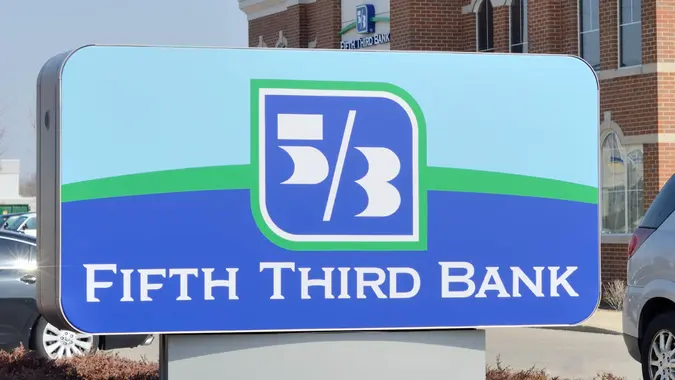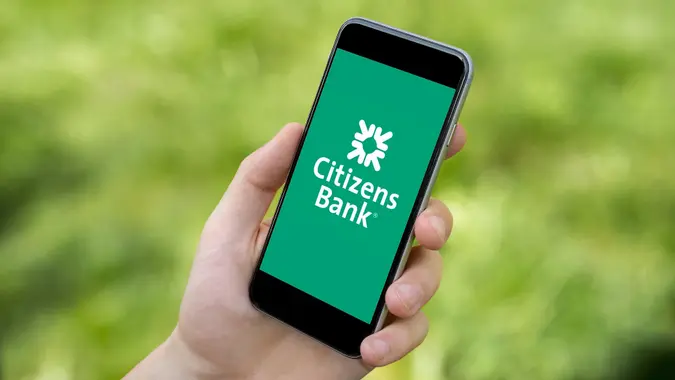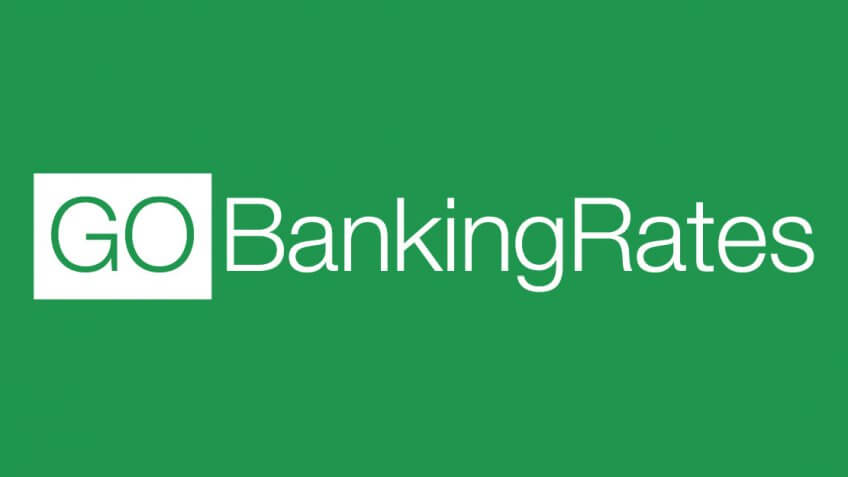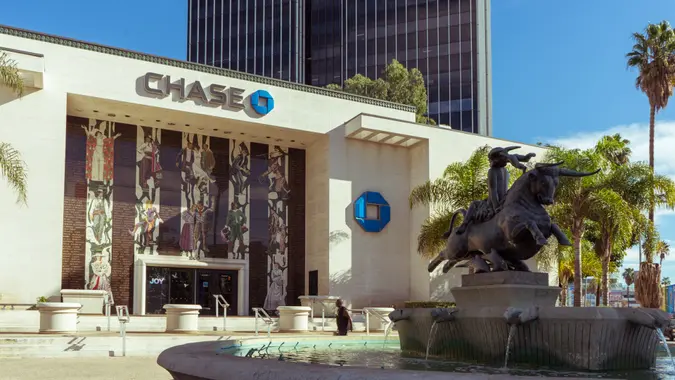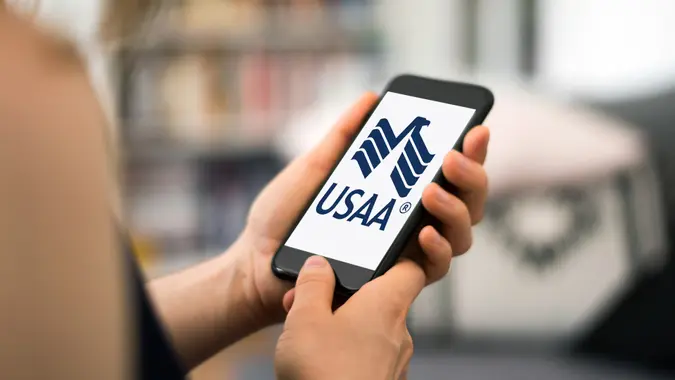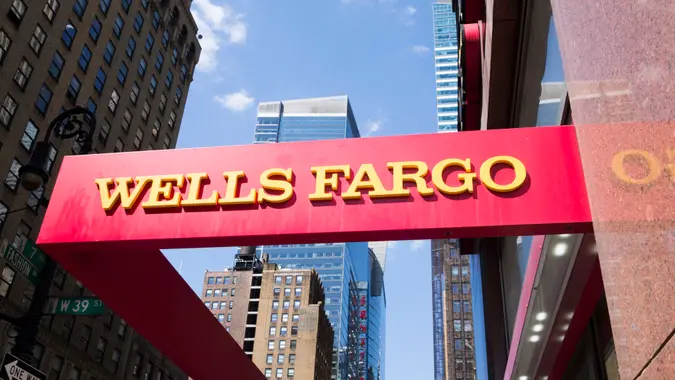Money Market Account vs. Checking Account: Which Should You Choose?

Commitment to Our Readers
GOBankingRates' editorial team is committed to bringing you unbiased reviews and information. We use data-driven methodologies to evaluate financial products and services - our reviews and ratings are not influenced by advertisers. You can read more about our editorial guidelines and our products and services review methodology.

20 Years
Helping You Live Richer

Reviewed
by Experts

Trusted by
Millions of Readers
There are numerous banking options, especially regarding checking and money market accounts. But which account is right for you? Do you need both accounts? Evaluating the features, pros and cons of checking and money market accounts will help you make an educated decision on what you need.
Here’s a brief guide to a money market account vs. checking account.
Money Market Account vs. Checking Account: Key Differences
If you’re deciding between a money market account and a checking account, it’s helpful to look at the differences. Check out this table to help choose which account is right for you:
| Feature | Checking Account | Money Market Account |
|---|---|---|
| Interest Rate | Typically very low or none (0%-0.5% APY) | Higher than checking accounts (often 0.5%-4.75% APY) |
| Minimum Balances and Fees | Lower minimum balance requirements, some accounts have fees | Often requires a higher minimum balance ($1,000+), some accounts have fees |
| Liquidity | Unlimited liquidity | Moderate liquidity because of transaction limits |
| Transaction Limits | Unlimited transactions | Six withdrawals or transfers per month |
| Best for | Always includes check writing and debit card access for everyday use | May include check writing and debit card access, but with restrictions |
Money Market Account Overview
A money market account is a type of deposit account with the features of checking and savings accounts. Money market accounts earn higher interest rates than checking accounts. Other money market account features include check-writing privileges, debit card purchases and FDIC/NCUA-insured protection.
Many use a money market account for emergency savings. Most people like the option of saving while also having access to funds.
However, money market accounts require a minimum balance and can have fees. Transactions are limited to six withdrawals a month.
Checking Account Overview
Most people are familiar with checking accounts. These accounts are a type of deposit account used for daily transactions. You can use your checking account for deposits, withdrawals and transfers for unlimited transactions. Checking accounts come with check-writing privileges, debit card access and online banking.
Checking accounts have a low barrier to entry. Most require no or a low minimum deposit. Some checking accounts have no monthly maintenance fee. Those charging a monthly maintenance fee usually have easy ways to waive fees. Checking accounts are ideal for day-to-day expenses, bill paying and shopping. They typically earn little to no interest and have minimum balance requirements.
Pros and Cons of Money Market Accounts
If you’d like to open a money market account, knowing the pros and cons is helpful. Check out the advantages and disadvantages:
Pros
- Higher interest rates: Money market accounts are similar to high-yield savings accounts and can feature APYs as high as 4%-5%.
- Emergency funds: You can use a money market account to build up emergency funds.
- FDIC and NCUA insurance: Funds in a money market are insured up to $250,000 per category, per depositor.
- Flexibility of short-term savings: Ideal for holding funds you may soon need while still earning interest.
Cons
- Limited transactions: You are limited to six withdrawals a month for a money market account.
- Potential fees: You can get charged fees if your balance drops below a certain minimum.
- Lower return compared to other investments: Other investments like mutual funds, ETFs and IRAs often have a higher rate of return.
Pros and Cons of Checking Accounts
Checking accounts also have advantages and disadvantages. Here’s a list of pros and cons:
Pros
- Liquidity: You can withdraw or transfer money out of your checking account at any time, with unlimited transactions.
- Widespread acceptance: Most vendors accept payments from a checking account.
- Check writing and debit card access: Checking accounts come with check-writing privileges and debit card access.
- FDIC and NCUA insurance: Funds are protected up to $250,000 per depositor, per category.
Cons
- Low or no interest: Checking accounts typically earn low or no interest.
- Potential fees: Monthly maintenance fees, overdraft fees and ATM fees can add up quickly if you do not pay attention.
- Less security for long-term savings: Checking accounts don’t typically encourage saving.
When To Choose a Money Market Account
The ideal candidate for a money market account is interested in short-term savings or building an emergency fund. You can save money by earning a higher interest rate while still having access to your funds.
Keep in mind, depending on the bank you may have to maintain a minimum balance in the account to avoid incurring penalties. If you can meet the balance requirements, this type of account is a great option to grow your money.
When To Choose a Checking Account
Checking accounts are best for those who need unlimited access to their funds for day-to-day transactions. A checking account is an acceptable form of payment for shopping, bill payments and other transactions. You have unlimited check-writing privileges and debit card purchases.
Checking accounts are ideal for flexibility, but aren’t the best savings option.
Final Take: Money Market Account vs. Checking Account
A checking account is the best vehicle to manage your money daily. With complete freedom to withdraw funds in various ways at any time, a checking account makes it easy to make purchases and pay bills.
With high interest rates, a money market account can be a great place to stash emergency savings. You can access it in seconds in a real emergency, but fees for excessive transactions may cause you to think twice before tapping into the money in your money market account for everyday living expenses.
If you already have a checking account, perhaps a money market account would also work for you. Evaluate your financial portfolio to decide whether one or both accounts would make sense.
FAQ
Although the basic idea behind a checking account and a money market account can be simple to understand, there are still many common questions surrounding them, in part because there are so many moving parts. Here are the answers to some of the most frequently asked questions regarding money market accounts vs checking accounts.- Can I use a money market account like a checking account?
- Yes, a money market account has check-writing privileges and debit cards. However, unlike checking accounts, money market accounts have a limit of six monthly withdrawals.
- Do money market accounts come with debit cards?
- Yes, money market accounts come with debit cards. However, this policy may differ from bank to bank.
- Which account is better for saving money?
- A money market account is better for saving money since it has a higher interest rate than a checking account. Money market accounts limit the number of withdrawals while checking accounts have unlimited transactions.
- Are money market accounts FDIC insured?
- Yes, money market accounts are insured. If the account is at a bank, it's FDIC-insured. If the account is at a credit union, it is NCUA-insured.
- What are the transaction limits for a money market account?
- Usually money market accounts are limited to six withdrawals or transfers per month.
Editorial Note: This content is not provided by any entity covered in this article. Any opinions, analyses, reviews, ratings or recommendations expressed in this article are those of the author alone and have not been reviewed, approved or otherwise endorsed by any entity named in this article.
Our in-house research team and on-site financial experts work together to create content that’s accurate, impartial, and up to date. We fact-check every single statistic, quote and fact using trusted primary resources to make sure the information we provide is correct. You can learn more about GOBankingRates’ processes and standards in our editorial policy.
- Federal Deposit Insurance Corporation "Deposit Insurance FAQs"
- National Credit Union Administration "Share Insurance Coverage"
- U.S. Public Interest Research Group "How a checking account works, step by step"
- Consumer Financial Protection Bureau "An essential guide to building an emergency fund"
- Consumer Financial Protection Bureau "What is a money market account?"
 Written by
Written by  Edited by
Edited by 



